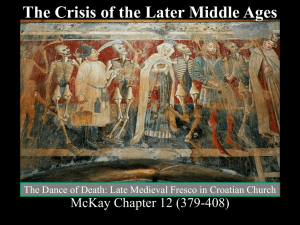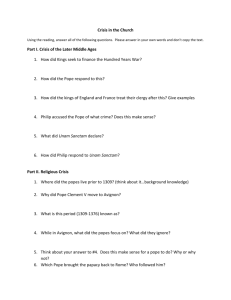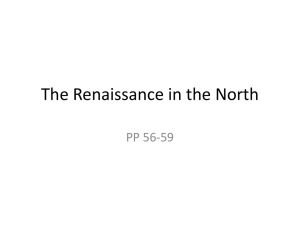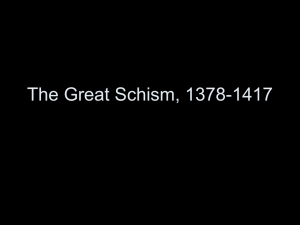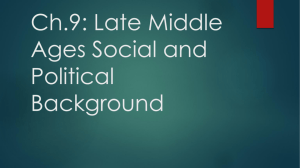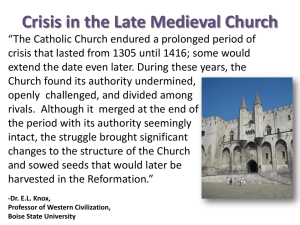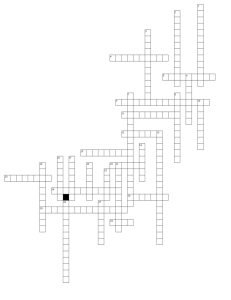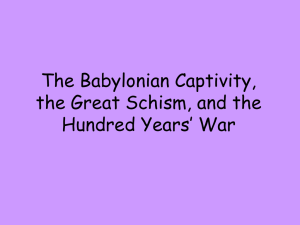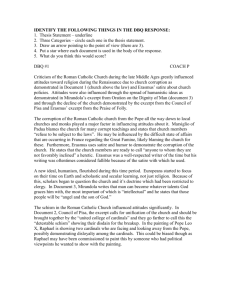-
advertisement
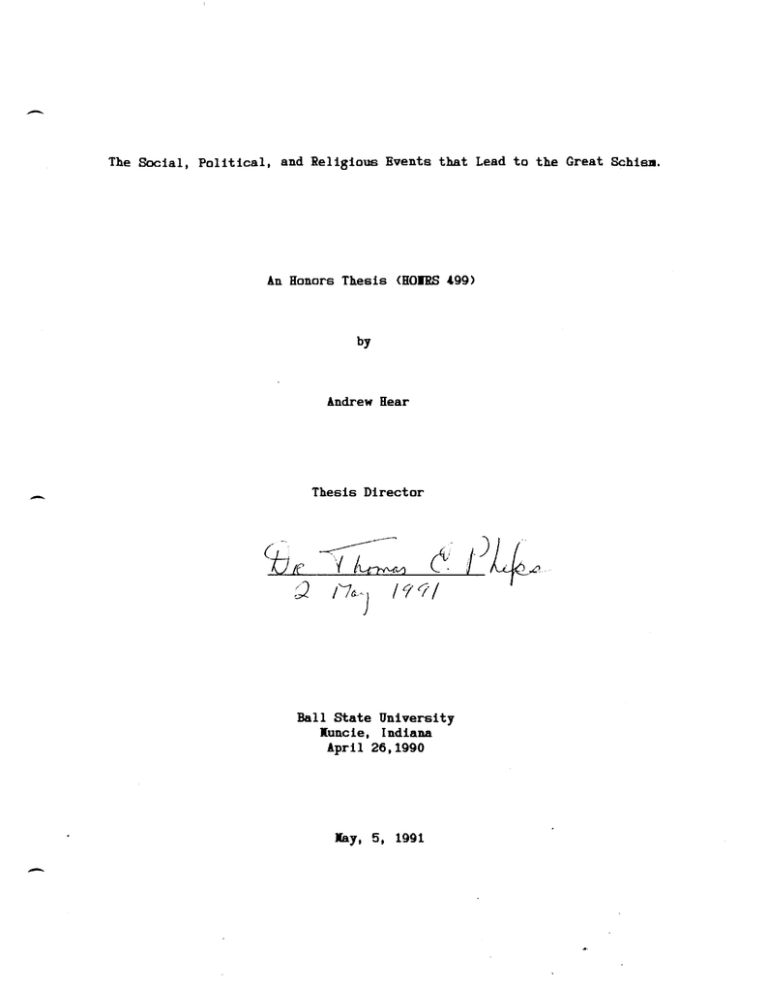
The Social, Political, and Religious Events that Lead to the Great SchisD. An Honors Thesis (HOIRS '99) by Andrew Hear Thesis Director Ball state University .uncie, Indiana April 26. 1990 Jay. 5, 1991 - - The stability of the Catholic Church was visible to everyone, and its spiritual and political authority were rarely challenged by its followers. In 1300, when Pope Bonifice VIII proclaimed a year of jubilee at Rome, it seemed to the cammon people, who flocked there in hundreds of thousands, that the Kingdom of Gad and its glory had at last become visible on Earth. the Rock of Peter was already being shaken. In fact, For example, in 1300, Philip the Fair, King of France refused to pay his church taxes, and his soldiers arrested Pope Bonifice VIII; a month later he died in jail. In less than a decade, the Popes left Italy and ruled the church from Avignon, France as French puppets. 1376. The captivity of the papacy at Avignon lasted from 1306 to During that period, seven Popes (Clement V, 1305-1316; John XXII, 1316-1334; Benedict XII, 1334-1342; Clement VI, 134-1352; Innocent VI, -, 1352-1362; Urban, 1362-1370; and Gregory XI, 1370-1378) ruled the church; all were Frenchmen. The migration of the papal court from Rome was disastrous, and in less than seventy years, the Rock of Peter split. begun. The Great Schism had The focus of this paper will illuminate the events leading to the Great Schism and its conclusion. Nationalism in the fourteenth century was growing rapidly causing many problems between rival countries and the Pope; "The church's dependence on France in this period of growing nationalism allover Europe weakened the influence of the papacy on the political life of the continent." 1- For example, England would not accept the papacy, because the English were intermittently at war with the French, and England resented French control of the papal envoys. The Germanic States found it hard to accept, because their rulers were used to exerting a direct influence on the Popes at Rome. While the papacy was at Avignon, the Holy Roman Empire decreed that their imperial elections should no longer be subject to papal approval and ruled that the Emperors did not have to follow the Pope's politics. The spiritual power of the Popes was not yet denied except by a few 2 -. extremists who had suffered under it, and scholars at the new Universities who began to argue about where the Pope's spiritual power began and ended. When the Pope became the mouth piece of the French King, directing the church from Avignon, the new men of the Renaissance began to question on what grounds the Pope wielded any power at all. Even though the Popes at Avignon appeared to be French puppets, they sti 11 had power; "Despite the scandals of the Fourteenth Century, the weakness of the Pope's, the growing nationalism of the peoples, and the widening speculations of the scholars, Peter's Rock still seemed firm enough to withstand any shocks." 'l. In 1376, Pope Gregory XI led the papal court back to Rome. was something of a triumph. The journey It was begun unwillingly after pressures on the Pope at Avignon had become intolerable and ended gloriously with the Pope mobbed by cheering crowds of Romans. -. The senate and the people presented Gregory XI with the keys of the city, its states, bridges, and fortress. Convinced that a new era had began in the Catholic Church and the Roman city, the citizens were willing to overlook the fact that the Pope was a foreigner. While Gregory continued to live, and rule from Rome, no one in Italy could successfully dispute his Apostolic authority or attempted to do so. Gregory VI lived only fourteen more months after arriving in Rome, and historians said that when he died the Xiddle Ages died with him. After the Pope's death, it became clear that only his position in the Church had protected him, because there was no love in Rome for Frenchmen. The day after his death, the mobs were aut in the streets demanding an Italian Pope. Whoever had been elected to succeed Gregory XI would have found himself in serious trouble. - The Church desperately needed a good ruler; "these turbulent times demanded an impassible combination of qualities in the next Pope: firm conviction, a generous mind, and international outlook, a steady nerve, greatness of soul, saintliness, diplomacy, skill in war, and love of peace." 3 3 -, Within .a day of Pope Gregory Xl's death, all the members of the Sacred College of Cardinals in Rome knew that if a foreigner was elected to succeed the Pope, the new one probably would nat live to rule. threatened. The Cardinals were For instance, "the French Cardinal Jean de Cros was warned, give us an Italian or a Roman Pope or all the Cardinals from beyond the Alps will be knifed. Almost all the Cardinals were from beyond the Alps. II ~ Five of the the total of twenty-two were still living at Avignon, because they refused to accompany Gregory XI to Rome. French. Of the sixteen who were in Rome, eleven were There was one Spaniard, Cardinal Peter de Luna and the remaining four Cardinals were Italians. If the French Cardinals united, it would have given any candidate with French backing, the twa-thirds majority needed for election. The rule for papal elections, drawn up by Alexander III, a century and a half earlier, required these sixteen men to wait ten days after the death of the Pope before entering into a secret conclave to choose his successor. The election of the Pope had been a sacred tradition; "in the Fourteenth Century, the tradition of the church taught that the Popes were elected by the Holy S" Spirit of God operating through the minds and wills of the cardinals." The Romans of 1378 had good reason to know that the Cardinals were open to the influence of ather forces not spiritual. Emperors and Kings had for centuries guided the church in its choice of earthly rulers. The Romans felt that if a foreign Pope was elected, the papal court might one again leave Rome, and that would have been intolerable. The Holy Spirit, who had so often showed His will through the different Kings, could also be revealed through the people of Rome. - During the ten days before the conclave, the Romans spared no effort to win what they wanted, Rome became a place of terror to the French Cardinals. Citizens took over the functions of the papal guard, ruled the whale district and expelled the nobles whose duty it was to protect the Cardinals. Fearing 4 that the Cardinals might attempt to escape from the city and elect a new Pope .- elsewhere, the Romans blocked the roads out of the city and confiscated the oars and rudders of all the boats around the city. When news of these events spread, bands of armed men came in from the countryside, and fighting broke out in the streets. the worst to come. Thoughtful Romans and insightful visitors were ready for Some sent their possessions into the country, while others, like Cardinal Peter de Luna, made their wills. however, sE~emed Most of the Cardinals, not to have taken the threats very seriously. The Cardinals continued to live in the city only taking a few extra precautions. The majority of the sixteen Cardinals stated later that the election was invalid, because it was not free. The Cardinals knew that there were rules against voting under pressure; "ecclesiastical Cannon law stipulated that to assume valldity, a papal election had to be freely made by Cardinals not under -, the constraint of fear." '- There is no doubt that the pressure on them to elect an Italian was extreme. As they entered the conclave, the twelve governors of the districts of Rome warned the Cardinals to name an Italian or Roman Pope: otherwise their lives are in danger. The message was strongly emphasized by a riotous mob demonstrating outside the palace throughout the night. Three days after the conclave ended, Cardinal de Luna's servant wrote about that night; "one hour after we were shut up, there arose from outside an uproar from the mob which grew until the Cardinals could hardly make themselves intelligible to one another. or an Italian Pope! 'tt f Eventually, the shout became, 'Death Bonfires, ready to burn the Cardinals if they made a mistake, were being made on the corners of the narrow streets leading to the Vatican. - After a Xass of the Holy Spirit had been performed in the morning. the Cardinals were in very real but not immediate danger. At this point. one of them refused to take any part in an election held under such conditions. He was Cardinal Orsini, the Roman whom most Romans wanted as their Pope. protest was not strong enough to delay the count. His When the voting papers were 5 read, the Cardinals' choice was found to have fallen unanimously upon Bartholomeci Prignano, the Archbishop of Bari, a Roman. The Archbishop of Bari was not a Cardinal, and he was not actually present at the conclave. The Cardinals had to delay the announcement of the election until he cCiuld be notified. would not. The Cardinals waited, but the people of Rome Cardinal de Luna's servant was an eye witness of what happened: "there arm:;e an even more powerful howl from the devi 1 possessed mob: a Roman." we want With swords and that cryan their lips, they finally broke into the chapel. While the guards were fighting to hold the mob back, some of the Cardinals hastily dressed the aged Roman Cardinal Tebaldeschi in papal robes, put him on the throne, and left him to the entering mob. act and told the people he was not the Pope. -, the French Cardinals to get away. windows to escape the swords. He refused to continue with the The delay was long enough for They climbed over roofs and dropped out of Some hid in odd corners of the city, and others merely went to their rooms in the Vatican and waited for the noise to die down. None of the Cardinals were actually harmed in any way. The announcement of the election seemed to have been greeted with happiness, both in Rome and beyond. Whatever doubts the original sixteen Cardinals had against the newly elected Pope, Prignano <Urban VI), not one of the twelve who could be found the next day declared himself unwilling to take part in the enthronement of the new Pope on Easter Sunday. Letters that were sent out by the Cardinals during the next few days announcing the election of the new Pope to the princes of Europe indicated no doubts about the validity of the proceedings. ,- Before his election, officials regarded Prignano as a model Papal Courtier, serving loyally at Avignon, as a Vice-Chancellor Gregory XI i "St. Catherine of Sienna, who had made a journey to persuade Gregory to come to Italy, said that the Archbishop of Bari was the only man at court fit to be Pope and rejoiced at the news of his election." 'l Later, however, Urban 6 -. VI's behavi.or changed, and all who opposed him said that the shock of being elected Pope was too much for his mind. As soon as Urban had been crowned and enthroned, he set in motion a general reform. The particular crimes the Pope went after were 'clerical ostentation' and 'simony,' the selling of ecclesiastical offices. Extravagance under Gregory XI had reduced the papacy to borrowing money on large scales. Although long forbidden, simony continued compromising the church and making it impossible for popes and bishops to effectively condemn secular financial corruption. If Urban's intended reform was necessary, the methods he used in attempting to achieve it were terrible. During the first months of his term he did no more than shout insults and try to strike anyone who annoyed him. Eventually, Urban accused five Cardinals of charges against the Church. -. As a result, Urban made enemies of the Cardinals and of the papacy's closest allies. For sometime, no overt move was made against him. Christian rulers of Europe denounced the election. None of the Even Charles V of France, who had obviously lost most as a result, raised no objection that first year. However, opposition existed and grew; "Even St. Catherine of Sienna was writing to him saying that justice without mercy may well seem like injustice and go about your work with moderation and benevolence and tranquil heart. For the love of Jesus crucified, soften a little the sudden movements of our temper." (0 By ones and twos, the Cardinals began to leave Rome, using the excuse that it was now summer, and the city was too hot. the French Cardinals. of Rome. The first to go were They went to Anagni, a small city forty miles southeast By June, the papal court was severely depleted. Urban, instead of creating enough Italian Cardinals to outvote the French Cardinals (as S1 Catherine of Sienna suggested to him) asked them to return. Their reply was that he had no right to ask them to come back. The Cardinals felt that they had elected him in fear for their lives when it was quite possible that he was 7 not really the true Pope. In late July, three of the four Italian Cardinals left Rome for a secret destination. The fourth, Francesco Tebaldeschi, Urban's only remaining supporter in Rome, was dying. at Anagni. A few days later, the three Italians appeared By August, thirteen of Urban'S sixteen Cardinals were together in Anagni; one was dead and the other two were in France. In August, the French Cardinals issued a proclamation from Anagni declaring that Urban VI was not the Pope, and that the Church had no ruler. They invalidated the election of the Archbishop of Bari, and they excommunicated him. Another conclave was held in a place of peace and safety. The place the rebel Cardinals chose for their conclave was Fondi, a city on the Fia Appia, almost midway between Rome and Naples, within jurisdiction of Queen Joanna I of Naples and her fourth husband, Otto of Brunswick. Although Joanna's allegiance was with Urban, a native of her kingdom, she fought all her life to preserve the frontiers of her territory for her successors, and saw the Pope ruling in Rome as a definite threat. Urban VI had already succeeded in personally antagonizing Joanna, her husband, and her vassal, Count Gaetani of Fond!. because of Joanna's army. enemies. While the Cardinals remained at Fondi, they were safe Urban never forgave Joanna for protecting his He promised that within a few years it would cost her the throne and then her life. In addition, another minor incident encouraged the dispute between Queen Joanna and the Pope. In the wars of Piedmont and Tuscany, and at the conference of Sarzena, Joanna's soldiers helped support the papacy. The help was expensive and in 1378, Joanna was forced to ask the Pope to cancel her Kingdom's taxes for one year. The request upset Urban. In Xay, only one month after his election, he suddenly ordered the Queen's emissary to leave his place of honor at the papal table. When he protested, Urban lost his temper, angrily repeating his order, and the emissary walked aut, taking with 8 himself the friendship of Joanna and her husband, Otto of Brunswick. Urban added to the insult by publicly declaring that the Kingdom of Naples was being badly run, because it was ruled by a woman and that he would remove the queen and replace her with a son of Charles V of France. So when the rebel Cardinals sent a delegation to Naples, Joanna was willing to listen to their arguments against the validity of Urban's rule. The new conclave was not held immediately. The cardinals waited for internation.al reactions to their August Declaration before taking an irreversible step. France. They wanted to be sure of the support of Charles V of Later, in a letter from Charles V, he promised a subsidy of 20,000 Francs and an army to protect them against Urban. Charles also wrote to the Queen of Naples, urging her to do her best to protect the Cardinals. On the following day, the thirteen Cardinals, French, Spanish, and Italian, entered into conclave at Fondi. All the rules were observed. On September 2'0, they announced they had elected a true Pope, Cardinal Robert of Geneva, who would be known as Clement VII. The Rock of Peter had Split. Catherine of Sienna. when she heard of this second election wrote to her friend Urban saying, "these devils incarnate have not elected. a Christ on Earth, but have brought into being an anti-Christ against you, who are Christ on Earth." obviously not an anti-Christ. faithful service. s.~ Robert of Geneva, Clement VIII was He was an official of the Church with long and Robert of Geneva had been an executive in Gregory Xl's legate in Italy and the commander of the military forces of the Papal States. Charles V of France seemed to have been distressed about the situation. Although he had an interest in the election of his cousin and the return of - the Papal court to Avignon which could be confidently expected to happen, Charles V made no direct move either for Clement VII or against Urban VI until a month after the election at Fond1. He then called an assembly of the clergy of France to hear Clement's case from his envoys and debate the matter. The 9 clergy met and sought the advise of those French Cardinals who because they were absent from Italy, had not taken part in either election. They were opposed to ITrban. Charles V agreed with the absent French Cardinals, but not all of his clergy was on his side. The clergy from Normandy and Provence were especially difficult in this situation. University of Paris. Still moving cautiously, Charles consulted the The delegates of the University reported to the King that from the beginning the University had adhered to Clement VII as the true Pope. From then on, Clement was never without French Royal protection. Meanwhile, Urban had decided that action must be taken against Clement's other supporter, the Queen of Naples. declared her throne void. He said that she was a "schismatic" and One June 1, 1378, Urban named Charles of Durazzi, a great-nephew of Robert the Wise, Joanna's grandfather, King of Naples and the next day crowned him in St. Peters. Unfortunately for Joanna, Clement, having been defeated in a battle by Italian mercenaries fighting for Urban, was on the point of returning to France. The man whom she named as her heir, Louis Puko, the younger brother of Charles V of France, had not yet arrived in Naples. There was no soldier in Joanna's Kingdom capable of defeating Charles of Durrazzo in battle, and by July he had taken the whole Kingdom. Urban controlled Southern Italy. Political considerations left the rulers of France and Naples few hesitatione. over which of the rival Popes they would support, but the rest of Europe generally found itself in greater difficulties. Portugal decided for Clement and England for Urban. In the far West, There was little doubt that England made their choice, because France was their traditional enemy. - The English. refused to meet Clement's envoys and within three years had forced the King of Portugal to support Urban. and merged with France for an alliance. accepted Urban as the true Pope. Robert II of Scotland, chose Clement In Germany, the Emperor Charles IV When Charles IV died, he was succeeded by 10 his son Wenceslas IV of Bohemia, and he also chose Urban. - The nations of south-western Europe, except for Portugal, the Kings of Castile, Aragon and Navarre all remained neutral until they saw that the schism was not going to heal itself. Clement as the true Pope. The King of Castile later acknowledged It was eight years after the beginning of the schism before Aragon gave allegiance to Clement, and four more years before Charles III of Navarre decided against Rome and went towards Avignon. time, Urban had died in 1389 and Clement died of apoplexy in 1394. By that The schism looked permanent because their was an election of successors to both of them, Bonifice IX and Benedict XIII respectfully. In Italy, Naples in the first months inclined towards Urban until he alienated them. His violence in his own domains drove Umbria and Tuscany into a hostile .:tlliance. Florence, Bologna and all the Northern Territories were in favor of Urban but later gave their support to Clement. The rulers of Sicily corresponded with both Popes, but later seemed more inclined with Avignon. unique. The position of the Papacy in the late fourteenth century was For both political and religious reasons, it was impossible for there to have been two Popes, since only one of the two could have been the true ruler of the Catholic Church. It was very important to know if the true line ran through Rome or Avignon, and to have decided how one of the lines, the false one could have been eliminated. The universities, the scholars, lawyers, simple priests, and laymen played an active part in shaping the future of the Church. of national voting on international affairs. They invented the system The first time, they used this was during a council at Pisa set up to end the schismj it failed. The second time it was used, at the 1415 Council of Constance, the results were ambiguous - but the schism was ended. The Council of Constance was quite different from the other Church Councils. Its origins were different. It was called not by a Pope, but by the 11 - Emperor, Sigmund, the German King of the Romans. This Council demanded the resignation of Gregory XII, John XlIII, and Alexander V, the rival Popes; three were living at this time. The council's end was predictable. It had argued for the total subjectivity of future Popes to the authority of general councils. Kartin V, the Pope emerged as the ruler of the Church, and the continent of Europe had been subtly and permanently changed; "The Great Schism and the Council of Constance which ended it determined the pattern of II Reformation and counter-reformation." Also it helped lay the foundation for the development of modern Western political thinking on the distribution of power. - End Notes 1. Margaret Deanesly, A History of the Medieval Church 590-1500 ( Cambridge: University Press, 1978), p. 184. 2. Ibid., p. 236. 3. Walter Ullmann, The Origins of The Great Schism ( Archon Books, 1967), p.61. 4. Howard Kaminsky, Simon de Cramaud and The Great Schism ( New Jersey: Rutgers University Press, 1983), p. 117. S. R.N. Swanson, Universities, Academics, and The Great Schism ( New York: Cambridge University Press, 1979), p.42. 6· Ibid ., p. 45. 7. Howard Kaminsky, Simond de Cramaud and The Great Schism ( New Jersey: Rutgers University Press, 1983), p. 123. 8. Ibid., p. 124. 9. Marzieh Gail, The Three Popes ( New York: Simon and Schuster, 1969), p. 75. - 10. Ibid., p. 77. 11. Ibid., p. 80. 12. Ibid., p. 83. 13. Walter Ullmann, The Origin of The Great Schism Archon Books, 1967), p. 90. -. Bibliography Davis, Ralph. A History of Medieval Europe. New York: David McKay Company, Inc., 1970. Deanesly, Margaret. A History of the Medieval Church 5901500. Cambridge: University Press, 1978. Falco, GiorgIo. The Holy Roman Republic. Translated by K.V. Kent. New York: Barnes and Co., 1964. Gail, Marzieh. The Three Popes. New York: Simon and Schuster, 1969. Kaminsky, Howard. Simon de Cramaud and The Great Schism. New Jersey: Rutgers University Press, 1983. Koenigsberger, H.G .. Medieval Europe 400-1500. Hong Kong: Longman Group (FE) Ltd., 1987. Morrall, John. Gerson and The Great Schism. Manchester: The University Press, 196u. Swanson, R.N. Universities, Academis, and The Great Schism. New York: Cambridge University Press, 1979. Trevor -Roper, Hugh. The Rise of Christian Europe. Harcourt, Brace, and Worldlnc., 1965. Ulimannn, Walter. The Origins of The Great Schism. Archon Books, 1967.
